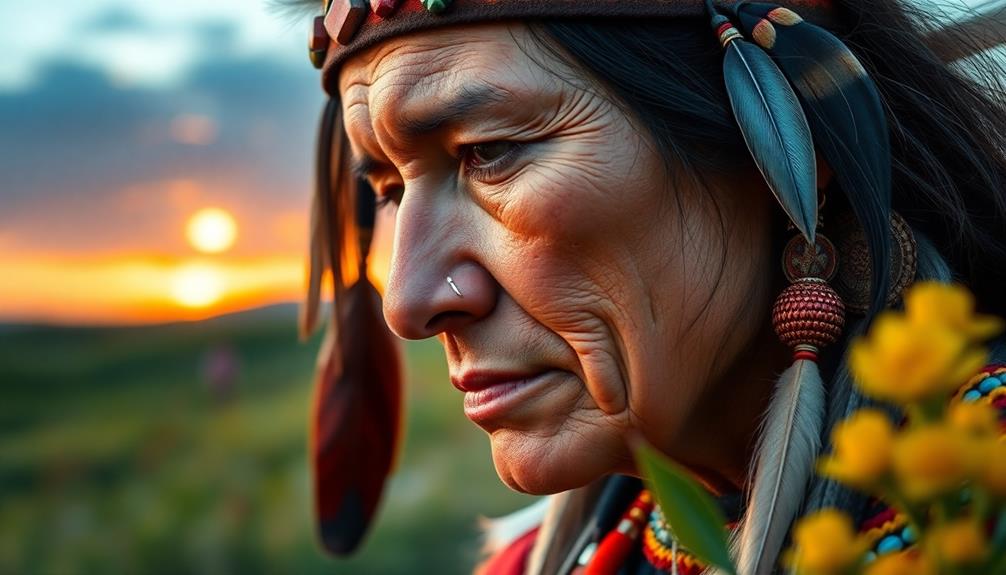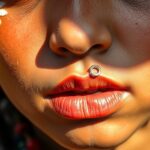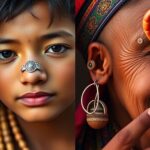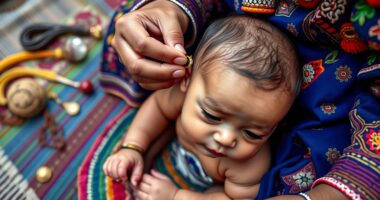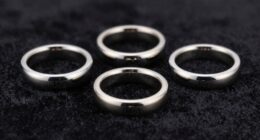In Native American cultures, piercings hold deep spiritual meaning and reflect personal and tribal identities. They often mark important life stages, serving as rites of passage into adulthood. For instance, ear piercings can invoke blessings and enhance your connection to ancestral wisdom. Nose and lip piercings symbolize beauty and social status, reinforcing community ties. Each piercing is a unique expression of identity and a link to heritage, shaped by rituals and shared experiences. Embracing these practices not only honors tradition but also celebrates your life journey. There's so much more to uncover about these beautiful customs.
Key Takeaways
- Piercings in Native American cultures symbolize spirituality, identity, and connection to ancestors, reinforcing personal and tribal heritage.
- Ear piercings mark rites of passage, invoking blessings and enhancing guidance from ancestral spirits.
- Nose and lip piercings reflect beauty, social status, and maturity, integral to cultural rituals and community belonging.
- Piercing rituals often accompany significant life changes, celebrating transformation from childhood to adulthood through communal ceremonies.
- Jewelry choices in piercings embody personal expression and spiritual beliefs, showcasing unique cultural artistry and heritage.
Historical Context of Native American Piercings

Throughout history, Native American cultures have embraced body piercings as profound expressions of spirituality and identity. These piercings served various purposes across different Native American tribes, often tied to spiritual significance and rites of passage. For instance, the Crow tribe incorporated piercings into their Sun Dance ceremony, helping participants connect with spiritual dimensions and facilitating personal growth.
Septum piercings, prevalent among the Aztecs and Mayans, symbolized wealth and social status, echoing similar values found in Native American cultures. These practices highlight the rich history of body modification as a powerful statement of cultural identity. They weren't just adornments; they were markers of belonging and reflections of the individual's role within their community.
Many tribes utilized piercings as a means to signify age and social standing, reinforcing a sense of tribal affiliation that's essential to their cultural fabric. Each piercing carried its own meaning, reinforcing connections to ancestors and the earth.
Spiritual Meanings of Ear Piercings

Ear piercings hold deep spiritual meanings in many Native American cultures, serving as significant rites of passage that mark personal growth and the journey into adulthood. The act of piercing your ears often involves spiritual ceremonies that invoke blessings and protection from ancestral spirits. These rituals highlight the importance of ear piercings in your life, connecting you to both your heritage and the spiritual domain.
In some tribes, ear piercings are believed to enhance your ability to hear and receive guidance from ancestral spirits. The earrings you wear can carry specific meanings, reflecting your personal achievements or tribal identity. Curiously, multiple piercings are thought to offer additional protection against negative energies, indicating your status within the community.
Here's a table summarizing the spiritual meanings of ear piercings:
| Meaning | Description | Example |
|---|---|---|
| Rite of Passage | Marks personal growth into adulthood | Ceremony for first ear piercing |
| Protection | Shields from negative energies | Multiple piercings for strength |
| Tribal Identity | Represents achievements and cultural heritage | Unique earrings representing lineage |
Significance of Nose and Lip Piercings
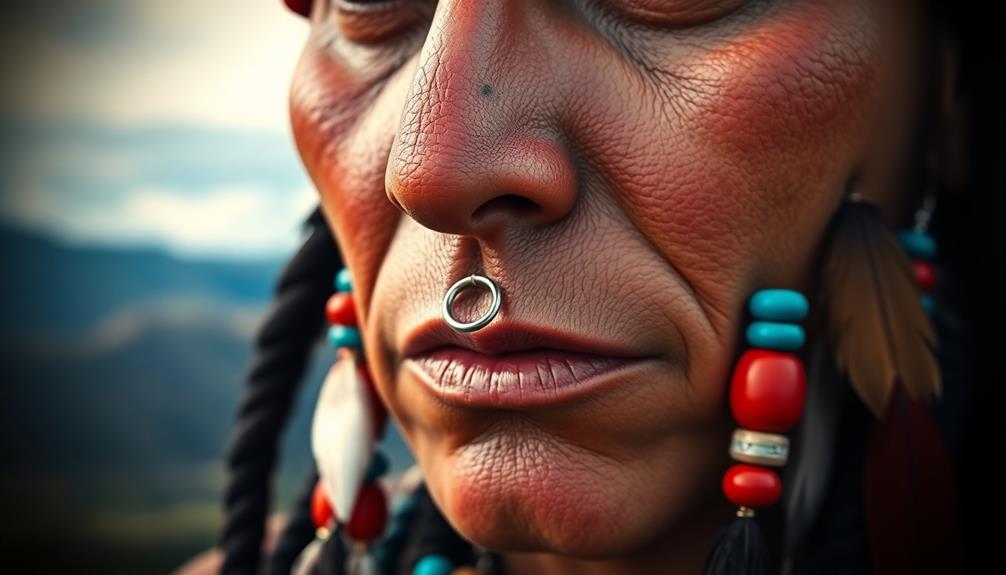
Nose and lip piercings carry significant cultural and spiritual meanings in many Native American communities, often symbolizing beauty, identity, and a rite of passage. In these cultures, nose piercings aren't just adornments; they reflect tribal identity and the spiritual significance tied to personal and communal heritage.
You might find that these piercings mark an individual's journey within the community, enhancing their connection to tradition.
Lip piercings, although more distinct in some cultures, also play an essential role in defining social status and maturity. For example, among tribes like the Mursi and Surma, the size of a lip plate can indicate a woman's marital eligibility and bride price.
This highlights how lip piercings serve as powerful symbols of identity, showcasing cultural values and societal roles.
Both nose and lip piercings are integral to various rituals and ceremonies, reinforcing a sense of belonging within the community. They embody the essence of cultural heritage and the shared beliefs that bind individuals together, ensuring that these practices continue to resonate through generations.
Ultimately, these piercings represent more than just beauty; they encapsulate the spirit and identity of Native American cultures.
Piercings in Rites of Passage
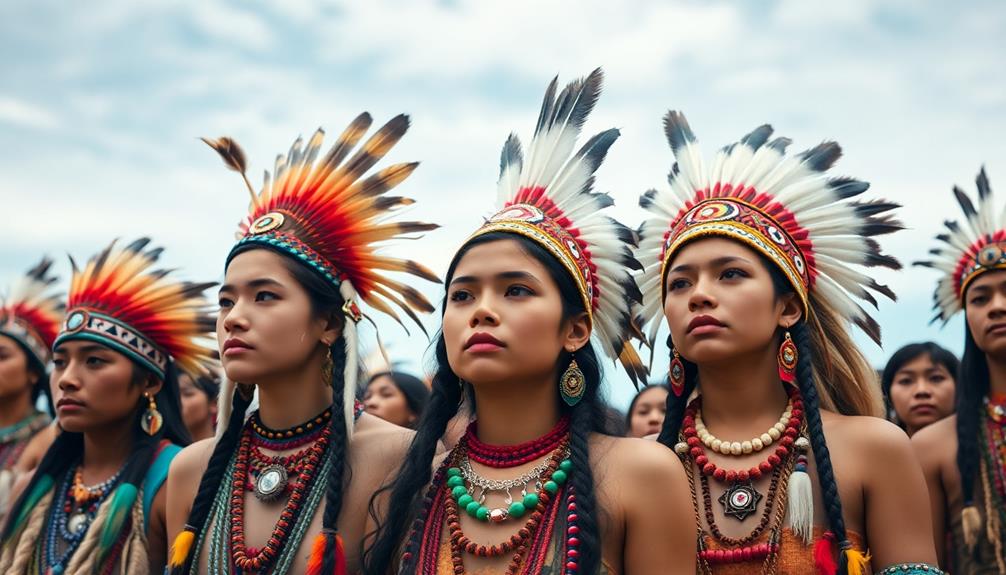
Piercings play an essential role in the rites of passage within many Native American cultures, marking important changes in individuals' lives. These body piercings often symbolize a transformation from childhood to adulthood, carrying deep spiritual and cultural significance.
For instance, the Crow tribe incorporates body piercings into the Sun Dance ceremony, where participants demonstrate spiritual sacrifice and personal commitment to their community and the Creator.
Among the Ojibwe people, ear piercings are performed on young girls during a coming-of-age ceremony. This rite signifies their maturity and readiness for womanhood, highlighting the importance of cultural traditions.
Similarly, while not Native American, the practices in the Mursi tribe of Ethiopia, where lip piercings indicate social status and readiness for marriage, reflect similar themes of growth and responsibility.
These piercing rituals are often accompanied by prayers, songs, and dances, reinforcing the spiritual significance tied to the rites of passage.
Personal Expression Through Piercings
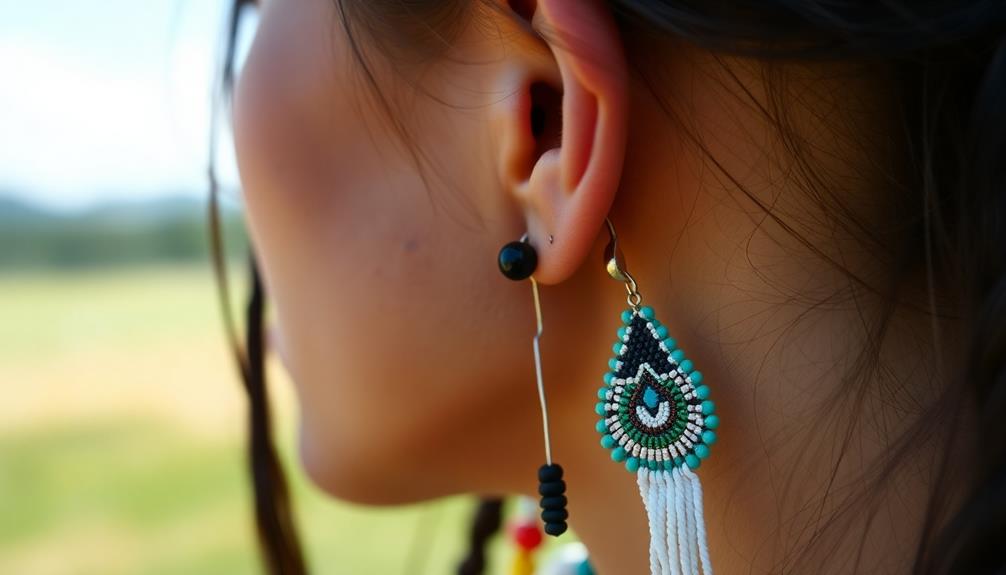
How do piercings reflect personal identity and beliefs within Native American cultures?
Piercings are more than just body modifications; they embody personal expression, cultural significance, and spiritual beliefs. They mark significant rites of passage, representing your growth and connection to your heritage. Through piercings, you showcase your unique identity while honoring your tribal affiliation.
Here are four key ways piercings reflect personal expression:
- Jewelry Choices: The adornments you choose often reflect your cultural heritage and personal style, showcasing the artistry of your tribe.
- Spiritual Symbolism: Certain designs are believed to provide protection or enhance your connection to the spirit world, integrating your beliefs into your physical appearance.
- Community Ties: The piercing process often involves communal ceremonies, reinforcing your ties with family and your tribe, making it a shared experience.
- Cultural Significance: Your piercings can signify your life journey and milestones, celebrating your identity within the community.
Ultimately, piercings serve as a powerful medium for personal expression while grounding you in your cultural roots and spiritual beliefs.
Frequently Asked Questions
What Did Native American Piercings Mean?
Native American piercings often signify personal growth and community ties. They represent rites of passage, social status, and spiritual connections, reflecting your journey and heritage while enhancing your identity within your culture.
What Is the Spiritual Significance of Piercings?
When you consider the spiritual significance of piercings, you're often looking at personal transformation, connection to heritage, and symbolic representation of strength. They can deepen your sense of identity and enhance your spiritual journey.
What Is the Traditional Native American Piercing?
Traditional Native American piercings often include septum and lip piercings, using materials like bone or gold. These practices symbolize status and bravery, serving as rites of passage that connect individuals to their cultural identity.
What Is the Indian Culture of Piercings?
Imagine a bride adorned with intricate jewelry, her nose ring gleaming. In Indian culture, piercings symbolize identity and status, marking marital ties and reflecting beauty, while also connecting to health beliefs and rich traditions.
Conclusion
In exploring the spiritual significance of piercings in Native American cultures, you uncover a rich tapestry woven with meaning and tradition. Each piercing tells a story, reflecting personal journeys and communal beliefs. Whether it's an ear, nose, or lip, these adornments serve as visible reminders of identity and growth. Just like the stars that guide travelers at night, piercings illuminate paths of self-expression and connection to heritage, inviting you to honor both the past and your own journey.

